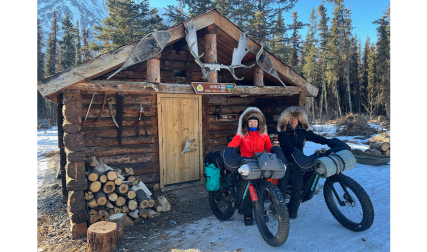Satisfied Investor Thank you for the insightful interview with Bill McNabb ’79, CEO of Vanguard [“Continuing Ed,” May/June]. As a long-time customer of his firm I am proud of Vanguard’s long association with Dartmouth—former CEO Jack Brennan ’76 was also a Dartmouth alum.
Vanguard is in a small minority of financial services firms that truly operate for the good of their clients. The combination of Vanguard’s long-term focus, no-nonsense approach and low fees has created more value for American investors than any other firm.
Career services offices should direct more seniors toward firms such as Vanguard instead of to Wall Street.
Yevgeny Neginsky ’00, Tu’05 New Haven, Connecticut
Living History I was quite pleased and surprised to find the name of my father, Francis Blake, class of 1908, at the top of page 52 in the story on old scrapbooks in the May/June issue of DAM.
As noted on one item shown, he was indeed wise but not always “solemn as an owl.” He was a loving father and grandfather and stayed with us for several months while mother prepared their home in Washington, D.C. We lost him soon thereafter.
As the sole surviving member of the family I am most grateful for this unexpected memory, as is my wife.
William D. Blake ’40 Bath, Maine
Mr. Baseball The article by Stu Deane ’65 about Tony Lupien [“Clutch Performance,” May/June] brought back a lot of memories. Lupien was Dartmouth baseball for many years, but he was much more than that.
I was his manager for five seasons (baseball and basketball), and he taught me as much about life as he did about sports—or is that the same thing?
With Lupien either you were one of the good guys or you weren’t. Somehow I made it into the former group, and I wanted to thank Stu for long overdue words about the most remarkable human being I have ever had the pleasure of knowing.
John Lallis ’69 Gladstone, New Jersey
Happy Memories It is with pride that I laud Dartmouth for having produced Pilobolus [“Campus,” May/June] in the first place and then to discover that it has commissioned the tribute to Happy Hooligan!
I must cavil with your description, however. Great he indeed was, but forgotten never. Ask any of us who worked on Jacko in those days—not dead nor yet beyond recall. There are even those of us who are still trying to translate “Nov Shmoz Ka Pop” (from a different strip). Let us abide with what Hamlet pére called Hamlet fils as he faded away.
Gregory Rabassa ’44 New York City
Air Ball I noticed in your May/June “Seen & Heard” section that you said Courtney Banghart ’00 coached the Princeton women’s basketball team to its first outright Ivy League title since 1999. Actually Princeton and Dartmouth tied for the Ivy title, with the Big Green defeating the Tigers in a one-game playoff to determine the league’s automatic bid into the NCAA tourney.In an unusual set of circumstances, that playoff win was Dartmouth’s third over Princeton that season, Banghart’s junior year.
Working with that 1998-99 Dartmouth women’s basketball team as sports information director remains one of my most enjoyable experiences in a media relations career that has now spanned three great schools and literally hundreds of teams. I still have my piece of the net from when we cut it down after that playoff game!
Mike Mahoney ’92 Philadelphia
On Architecture Though I am in general agreement with William Morgan ’66 concerning many of the recent additions, pro and con, to the Dartmouth campus [“Return of the Critic,” May/June], he failed to mention the Corey Ford Rugby Clubhouse by Lyme, New Hampshire, architect Randy Mudge. This wonderful building just north of campus is a fitting tribute both to the generosity of its primary benefactor and the legacy of a 60-year rugby tradition at Dartmouth. The finest rugby facility in the country, it’s architecturally one of the true gems on the Dartmouth campus, nestled as it is into the hillside overlooking the rugby pitch with its dark, shingled exterior and soaring spaces within.
Ted Bracken ’65 Washington, D.C.
DAM could have extended its fine focus on Dartmouth Olympic skiers [Jan/Feb] one more issue by including a profile of Edgar Hayes “Ted” Hunter Jr. ’38, a member of the 1936 U.S. Olympic ski team, in “Architectural Digest” [May/June].
Hunter and his wife practiced in Hanover, designing buildings including the Bradley-Gerry towers, while he taught at the College and earned a graduate degree in education. Their Modernist residential designs continue to shape the Hanover landscape.
In the late 1960s the Hunters moved to North Carolina, where they continued to design residences.
Hunter was a perfect early example of the combination of geography and institution that have influenced Dartmouth alumni to pursue careers in architecture, even in the absence of formal curriculum at Dartmouth.
Doug Leitch ’65 Orr’s Island, Maine
Power Point I am shaking my head that Scott Brown ’78 [“Going Nuclear,” Mar/Apr] ignored mentioning hydropower, which is another ’round-the-clock power option. My electricity comes from Hoover Dam, and much of New England’s comes from Hydro-Quebec.
Maybe he lumped it into renewable energy, but he did specifically mention solar, wind, geothermal and biomass.
I am a great supporter of nuclear power and embarrassed that my state has fought the Yucca Mountain Nuclear Waste Repository so vehemently. We repeatedly hear, “Do you want dangerous nuclear waste trucks on the freeways by your house?” Well, what is high-level nuclear waste if not spent fuel rods from power plants? How does anyone suppose the new, higher energy rods got to the plants? They went down the freeway in trucks!
While Yucca Mountain is not a perfect repository, it is better than storing waste above ground at plants around the country. The State of Nevada could turn its budget deficit into a surplus with the fees from other states (plus the profits from reprocessing rods) and could alleviate our high unemployment. Instead it has recently built another coal-fired plant and is planning more. At least the wind will carry that pollution to points east.
William D. Ramos ’66 Las Vegas, Nevada
Literature Matters To this day, as my Emerson students will attest, I remember learning experientially about what teaching is from James Cox [“The Novelist’s Muse,” Nov/Dec 2009]. I relate to students every term how Cox limped across the stage, threw down alphabetical piles of students’ papers, limped back to the podium and said, it seemed to me joyously, “It’s all risk now. I like a man who takes a risk!” This referred to guidelines he’d laid down at the outset of the course about late-paper submitters whose papers might never get read.
I have never forgotten his talking on and on—in the context, if I remember correctly, of a discussion on Lolita—about his difficulties in building a bridge at the foot of his property. His ruminating made electrifying sense to me, in terms of bridge-building, yes, but in terms of Lolita, too.
I credit Cox with much of my subsequent success as a professor. He instilled in me the confidence to believe that thinking enough about the topics I present allows me to “just” ramble about how they connect to me.
Steve Shipps ’66 West Newbury, Massachusetts
Cox convinced us that literature mattered as much as, and maybe more than, politics, psychology, sociology and economics in that it subsumed them all. The more widely you read in other fields, the more literature justified itself. Cox’s analysis of a passage was an opening to drill to the core of a work and to appreciate how the part represented the whole, how the style and substance fused so that a great work had integrity. His lectures had penetration.
In his essay on the history of the teaching of American literature at Dartmouth [published in the Dartmouth College Library Bulletin, 1966], William C. Spengemann wrote that Cox’s appointment in 1955 was to make “all the difference.” Cox’s essays on American writers “would set a new standard of literariness for literary scholarship, American or other. Along with Cox’s 1967 book, Mark Twain: The Fate of Humor (revised ed. 2002), and the articles on American autobiography later collected in Recovering Literature’s Lost Ground (1989), these essays put Dartmouth back on the map of American literary studies as ‘the place where Jim Cox teaches.’ ”
He was a generous mentor and he was generous in accepting invitations to teach at other institutions. Students left a Cox lecture with a charged mind. Some became writers, some teachers, and others went into a variety of professions, but all became more alert readers for a lifetime.
Thornton F. Jordan ’66 Columbus, Georgia
Cabin Fever Your splendid DOC issue [“100 Years of the DOC,” Sept/Oct 2009] elicited memories of my own DOC experiences. I had occasionally camped with classmates Taylor, Hollingsworth, Fenton and Papst, but at the 1950 Carnival break I had finished exams early and set out alone in street clothes with canned goods for Clough Cabin.
Above Lyme, New Hampshire, I encountered the first snow and crashed through 12 to 18 inches of crust until arriving at the cabin at dusk, wet and tired.
I awoke to a blinding sun in blue sky and decided to abandon the known trail and take a shortcut back to Hanover. Within an hour came a darkening cement sky and a whiteout blizzard. Without landmarks I sighted from tree to tree for hours, looking for a familiar lake. Whose woods these were didn’t then matter. After dark I found a lake—I know not which lake—and considered crossing it looking for the trail but imagined soft ice and trudged around it, soon finding a logging road, not less traveled but clearly untraveled as the blizzard had erased any tracks. I elected to go right and eventually saw a bleak light and heard a dog bark. I passed through a dormant Lyme and a farm truck dropped me on campus. I staggered up the four flights of Hitchcock and roomies Megargel and Kinnier barely looked up from their books as I stripped off soggy outer garments and crashed for 12 hours. No safety net in those days, just an entry in the DOC ledger that I was at Clough.
What saved me? Endurance. I had just come off the cross-country season with teammates Smiley, Rosenberg, Waterman, Daniell, McSorley and others.
Don Richardson ’52 Brevard, North Carolina
Dog Days The touching story of his Lab, Duke, by Richard Hansen ’07 [“Royal Treatment,” July/Aug 2009] brought back memories of my own Duke, a miniature schnauzer. Originally my wife’s idea while I was pursuing my doctorate at the University of Alabama, Duke came to occupy more of my time than hers. He accompanied me on most outings—classes, jogs and writing sessions—but the most interesting were visits to the library, where he would bark once on entry then settle down for the duration.
May Hansen retain the memories he obviously holds of his Duke and find another of like temperament to continue his canine memories.
F.J. Eicke ’61 Ocean Springs, Mississippi




